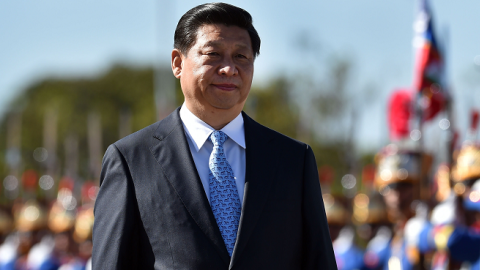In an episode of the popular political satire Yes Minister, permanent secretary Sir Humphrey Appleby explains to minister for administrative affairs Jim Hacker why Britain joined the European Economic Community. Britain did so not because it agreed with the European ideal but because disrupting the EEC from the inside was much more effective than attempting to do so from without. As Sir Humphrey explained further, the more members any organisation might have, the more arguments one could stir up within an institution, and the more impotent that institution became.
Thankfully, the US resisted the temptation to adopt this cynical approach to China’s Asian Infrastructure Development Bank initiative. But Washington nevertheless has missed a trick in declining to add its signature to a memorandum of understanding to establish the AIDB a fortnight ago. The region is largely comfortable with all facets of American power and the exercise of it in regional affairs because Washington is primarily an impartial shaper of rules and provider of opportunity. In behaving as a spoiler on this issue Washington has not done its standing, or that of Canberra, which it persuaded to remain on the sidelines, any favours.
It is true that China has been unhelpfully vague about how the AIDB will be governed, whether Beijing will use the institution to pursue narrow political objectives, and what standards (for example, environmental and labour) will apply to loans offered to recipients. As China will dominate the voting and governance arrangements within the proposed AIDB, such concerns are legitimate, based on China’s contemporary record in these matters.
For example, in the recent past Beijing has offered loans for infrastructure development under the cover of development aid to create compliant states from which political and strategic concessions are easily extracted. In its dealings with these client states, such as Cambodia and Myanmar, Chinese state-owned enterprises overseeing infrastructure projects tend to draw up commercial terms heavily favouring China’s interests over those of the host country. Chinese state-owned enterprises frequently have shown little regard for the environmental impact of projects. And China has an impressive record of getting things done largely because labour standards can be close to nonexistent.
Even so, money moves mountains. And the iron law of demand is the reason every non-advanced economy in the region, with the odd exception of Indonesia, decided to sign on to the memorandum of understanding to establish the AIDB a fortnight ago and attend the official launch — even The Philippines and Vietnam, which have been engaged in a series of tense standoffs over territorial disputes in the South China Sea. The Japanese-dominated Asian Development Bank, which the AIDB will rival, estimates that developing Asia needs more than $8 trillion of investment in infrastructure by 2020 to sustain high growth rates.
The combined capital base of the World Bank and the ADB is less than $400 billion, with less than $30bn worth of loans issued to Asian countries last year.
With a proposed capital base of $50bn that will rise to $100bn, the AIDB is not the cure-all for Asia’s infrastructure needs but may well be part of the solution.
Given that the AIDB will go ahead even without US and Japanese blessing, many commentators in Australia have already made the sensible point that fixing defects and shortcomings of the Chinese idea will be more effective if done early and from inside rather than outside the tent.
But there is also a bigger picture at stake here that goes to America’s standing in Asia. American pre-eminence is welcome in Asia largely because Washington promises to deploy its superior reserves of power to protect and uphold a system of rules that applies equally to all countries — what we know as the contemporary liberal order.
Even as such an order is dependent on superior reserves of American material and soft power to serve as a check against a China that pursues its own narrow objectives, often at the expense of upholding the liberal order, it is not Washington’s role to fulfil the impossible task of blocking all avenues for China to increase its stand-alone and institutional influence.
By encouraging security allies such as Australia and South Korea to join with it as non-signatories, Washington has reduced its own capacity and that of like-minded countries to influence the way the AIDB may work. In doing so, the US runs the risk of looking more like a self-centred spoiler rather than a constructive shaper and enabler of regional development and prosperity.
The wariness of Washington and Tokyo — and seemingly Canberra — may well be revealed as wisdom.
In its willingness to front up tens of billions of dollars for the AIDB, it could be that Beijing is determined to use the institution as a dedicated instrument to achieve narrow political and strategic goals and will not be swayed from that path.
If so, subsequent warnings that this is the case would carry more weight and be far more credible if countries that issued the warnings were at the time trying to establish sound ground rules for the AIDB from the inside.
Finally, in perhaps just a tongue-in-cheek scenario, it could be that a compelling ethical and pragmatic conclusion is reached in the future that the AIDB is categorically not in the region’s interest, such is China’s intransigence and self-regard. As a response, Sir Humphrey would recommend that Washington make a ‘‘pig’s breakfast of the whole thing’’, setting one member against the other to render the AIDB impotent.
Incidentally, China is doing precisely this in fomenting disunity among members of the Association of Southeast Asian Nations to perpetually delay the long promised binding code of conduct over maritime disputes in the South China Sea.
But as China demonstrably understands, even contemplating such cynicism requires the privilege of membership in the first place.




















